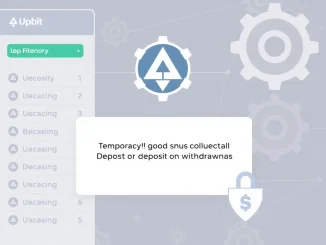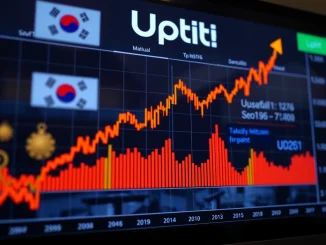
In a move that’s sending ripples of optimism through the South Korean crypto market, Upbit’s parent company, Dunamu, has scored a significant legal triumph. The Seoul High Court has just cancelled a hefty 13.4 billion won, approximately $9.2 million, in corporate and income taxes initially slapped on them by the National Tax Service (NTS). This isn’t just about the money; it’s a landmark decision that could reshape how crypto taxes are viewed in South Korea. Let’s dive into what this crypto tax ruling means for Upbit, Dunamu, and the broader crypto landscape.
Why is this Seoul High Court Ruling a Big Deal for Crypto Tax?
This isn’t your everyday tax dispute. The Seoul High Court decision, which became final on February 7th after the NTS decided not to appeal to the Supreme Court, underscores a critical point: the interpretation and application of tax laws to the rapidly evolving world of cryptocurrency are still very much in flux. Here’s why this ruling is making waves:
- Precedent Setting: The court’s decision to uphold the lower court’s January 17th ruling in favor of Dunamu sets a precedent. It signals a potentially more lenient approach from the judiciary towards taxing crypto exchanges, at least in similar circumstances.
- Financial Relief: For Dunamu, the immediate benefit is clear – a $9.2 million boost to their bottom line. This is money that can now be reinvested into innovation, platform development, or even passed on as savings to users.
- Industry Morale: Beyond Dunamu, this ruling is a shot in the arm for the entire South Korean crypto industry. It offers a glimmer of hope amidst often stringent regulatory landscapes and tax uncertainties.
- Clarity on Crypto Taxation: While the specifics of the tax dispute aren’t fully detailed in the initial report, the cancellation suggests potential ambiguities or overreach in the initial tax assessment by the NTS. This ruling may prompt the NTS to reassess its approach to South Korea crypto tax regulations and enforcement.
What Exactly Happened in the Dunamu Tax Case?
While the specifics of the Dunamu tax case haven’t been exhaustively detailed in the initial reports, we can piece together the crucial elements:

- Initial Tax Imposition: In January 2023, the National Tax Service (NTS) levied corporate and income taxes of approximately 13.4 billion won ($9.2 million) on Dunamu.
- Dunamu’s Legal Challenge: Dunamu contested this tax assessment, taking the matter to court.
- Lower Court Victory: On January 17th, a lower court ruled in favor of Dunamu, overturning the NTS’s tax imposition.
- Seoul High Court Affirms: The NTS appealed to the Seoul High Court, which ultimately upheld the lower court’s decision on February 7th.
- No Supreme Court Appeal: Crucially, the NTS chose not to pursue a final appeal to the Supreme Court, making the High Court’s ruling definitive.
This series of events indicates a robust legal challenge from Dunamu and a judicial system willing to scrutinize tax assessments in the crypto sector. The NTS’s decision not to appeal further suggests they may have recognized weaknesses in their initial tax claim or acknowledged the court’s interpretation.
How Could This Upbit Tax Victory Influence the Future?
The ramifications of this Upbit tax victory extend beyond just Dunamu’s balance sheet. It could potentially trigger a cascade of changes and considerations within the South Korean crypto and tax regulatory frameworks:
- Regulatory Re-evaluation: The NTS might need to refine its guidelines on taxing crypto exchanges. This ruling highlights the complexities of applying traditional tax frameworks to novel digital assets and business models.
- Increased Legal Scrutiny: Crypto businesses in South Korea might feel more empowered to challenge tax assessments they deem unfair or ambiguous, knowing there’s judicial precedent supporting a closer look at these cases.
- Investor Confidence Boost: Clarity and fairness in taxation are crucial for investor confidence. This ruling could be interpreted as a step towards a more balanced regulatory environment, potentially attracting more investment into the South Korean crypto market.
- Global Implications: While specific to South Korea, this case is being watched internationally. Countries grappling with crypto taxation can learn from this example of judicial review and the importance of clear, adaptable tax policies.
Navigating Crypto Taxes: Key Takeaways
For anyone involved in the crypto space, whether as an exchange, investor, or user, the Upbit tax case offers some valuable lessons:
- Compliance is Key, but So is Due Diligence: While adhering to tax regulations is paramount, this case shows that businesses should also rigorously review and, if necessary, challenge assessments they believe are unjust or incorrectly applied.
- Legal Representation Matters: Dunamu’s successful legal challenge underscores the importance of having strong legal counsel that understands both tax law and the intricacies of the crypto industry.
- Regulatory Landscape is Evolving: The rules of the game are still being written in crypto taxation. Staying informed about legal developments and engaging with regulators is crucial for navigating this evolving landscape.
- Transparency and Clear Record-Keeping: Maintaining meticulous records of all transactions and financial activities is essential for tax compliance and for defending against potential disputes.
Looking Ahead: What’s Next for Crypto Tax in South Korea?
The Seoul High Court’s decision in the Upbit tax case is a significant milestone, but it’s likely just one step in the ongoing evolution of crypto taxation in South Korea and globally. We can expect to see:
- Further Legal Challenges: As crypto businesses continue to operate and regulations adapt, more tax disputes are likely to arise, further shaping the legal landscape.
- Refined Tax Policies: Governments and tax authorities worldwide will continue to refine their approaches to taxing crypto, learning from cases like this and striving for clarity and fairness.
- Industry Dialogue: Ongoing dialogue between crypto industry players, regulators, and legal experts is vital to creating tax frameworks that are both effective and supportive of innovation.
Conclusion: A Welcome Relief and a Sign of Maturing Crypto Regulations
The Seoul High Court’s decision to cancel the $9 million Upbit tax bill is more than just a financial win for Dunamu. It’s a landmark victory that signals a potentially more balanced and considered approach to crypto taxation in South Korea. It’s a relief for the industry, a testament to the importance of legal challenges, and a clear indicator that the regulatory framework for crypto is still maturing. As the crypto world continues to evolve, rulings like this will play a crucial role in shaping a sustainable and innovative future for digital assets.



